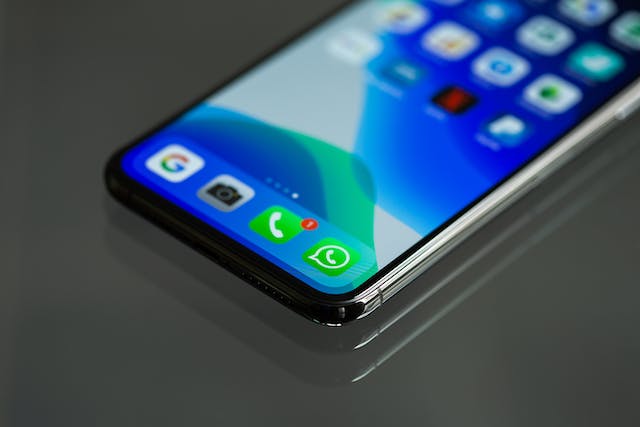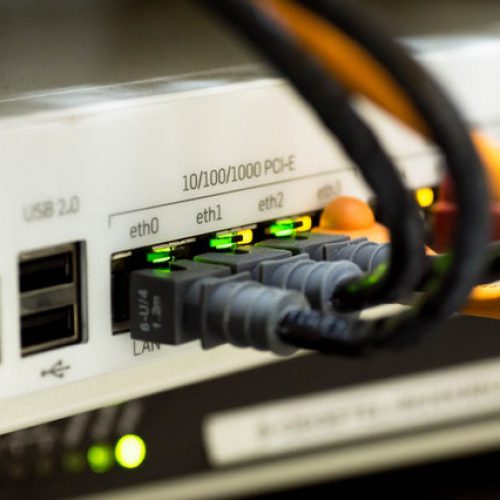Voice over Internet Protocol, more commonly known as VoIP is a technology that allows you to communicate with your voice, much like a phone, but over the internet rather than a traditional telephone network.
VoIP converts your voice into digital data packets that are then transmitter over your broadband connection. There are many advantages to using VoIP over traditional phone lines. For example, saving many, the vast array of additional features and it’s flexibility/reliability. You can also use VoIP on basically any device with an internet connection like a laptop, PC, mobile phone or tablet. It’s becoming more popular with businesses and individuals.
If you are looking to start using VoIP for your business or at home, get in touch with UtterVoIP today for the best price and amazing service.
You may already be using VoIP without realising! Is WhatsApp VoIP?
If you use WhatsApp then you are already using a VoIP system! Technically when you make a phone call or video call using WhatsApp instead of your phones built-in cellular connection you are using voice over internet protocol because it’s using the internet to make the calls rather than a landline of cell tower. According to Statista WhatsApp has over 2 billion users, which means over one quarter of the world uses VoIP!


Due to the nature of VoIP phone systems, WhatsApp is a great tool for making personal connections. The cloud-based technology allows users to have quick access to their phone systems from anywhere they have internet access. So you can take WhatsApp calls from your smartphone or tablet too. It also means you can travel or move locations while still being able to communicate with all of your friends and family.
How WhatsApp VoIP Works:
- Data Transmission:
- When a user initiates a voice or video call on WhatsApp, the application converts the audio and video signals into digital data packets.
- Internet Connection:
- These data packets are then transmitted over the internet, relying on the user’s internet connection to facilitate communication.
- End-to-End Encryption:
- WhatsApp places a strong emphasis on user privacy and security. All calls made through the platform are protected by end-to-end encryption, ensuring that only the intended recipient can access the communication.
- Device Compatibility:
- WhatsApp VoIP is versatile, supporting voice and video calls between users on different devices, be it smartphones, tablets, or desktop computers.
Advantages of WhatsApp VoIP:
- Cost-Effective Communication:
- Since WhatsApp calls utilize the internet, they can be a cost-effective alternative to traditional phone calls, particularly for international communication.
- Rich Media Integration:
- WhatsApp seamlessly integrates voice and video calls into its messaging platform, allowing users to switch between different modes of communication effortlessly.
- Cross-Platform Convenience:
- WhatsApp’s VoIP capabilities work across various platforms, ensuring that users can stay connected regardless of the device they are using.
Considerations:
While WhatsApp VoIP offers numerous advantages, it’s essential to consider factors such as internet connection stability and data usage, especially for video calls. Users should be mindful of their data plans and opt for a reliable internet connection to ensure a smooth calling experience.
Understanding VoIP
Traditionally, voice calls were transmitted through circuit-switched networks, but VoIP replaces this with a more efficient packet-switched network, where voice data is broken down into digital packets and transmitted over the internet.


How VoIP Works: The fundamental principle behind VoIP is the conversion of analog audio signals into digital data that can be transmitted over the internet. Here’s a step-by-step breakdown of how VoIP works:
Step 1: Analog-to-Digital Conversion:
When you speak into a VoIP-enabled device (such as a microphone or VoIP phone), your analog voice signals are converted into digital data. This conversion process is essential for transmitting voice over the digital infrastructure of the internet.
Step 2: Packetization:
The digital voice data is then segmented into small packets. Each packet contains a portion of the voice signal, along with additional information, such as the source and destination addresses.
Step 3: Transmission over the Internet:
These voice packets are transmitted over the internet through routers and switches. Unlike traditional circuit-switched networks, where a dedicated line is required for the entire duration of a call, VoIP packets can take different routes to reach their destination, optimizing network resources.
Step 4: Digital-to-Analog Conversion:
Upon reaching the destination, the digital voice packets are reassembled and converted back into analog signals. This is achieved through a process called digital-to-analog conversion.
Step 5: Voice Playback:
The final step involves playing back the analog signals, allowing the recipient to hear the voice message or participate in a real-time conversation.
Infrastructure and Protocols: VoIP relies on robust internet infrastructure and specific protocols to ensure efficient communication. Some common protocols include Session Initiation Protocol (SIP) for call signaling and Real-time Transport Protocol (RTP) for the transmission of audio and video.
Quality of Service (QoS): To ensure a smooth and high-quality voice communication experience, VoIP systems often implement Quality of Service measures. QoS prioritizes and manages network traffic to minimize latency, jitter, and packet loss, all of which can impact call quality.
Understanding these fundamental processes sheds light on the versatility and efficiency that VoIP brings to modern communication, enabling users to make voice calls, engage in video conferencing, and collaborate seamlessly over the internet.
Why Should I Use VoIP?
Cost Savings:
One of the most significant advantages of VoIP is its potential for cost savings. Unlike traditional phone systems that rely on dedicated lines, VoIP leverages existing internet infrastructure, significantly reducing both local and international calling costs. Businesses, in particular, can benefit from lower communication expenses, making VoIP an attractive option for cost-conscious individuals and organisations.
Flexibility and Mobility:
VoIP liberates communication from physical constraints. Whether you’re in the office, at home, or on the go, VoIP allows you to make and receive calls as long as you have an internet connection. This flexibility is particularly valuable for remote workers, distributed teams, and individuals with dynamic lifestyles who need to stay connected regardless of location.
Feature-Rich Communication:
VoIP systems come packed with an array of features that enhance communication experiences. These may include voicemail, call forwarding, video conferencing, and the ability to integrate with other collaboration tools. The feature-rich nature of VoIP not only improves communication efficiency but also contributes to a more streamlined and productive workflow.
Scalability:
As businesses grow, so do their communication needs. VoIP systems are highly scalable, allowing for easy expansion without the need for significant infrastructure changes. Whether you’re a small startup or a large enterprise, VoIP adapts to your evolving communication requirements, providing a scalable solution that grows with your organisation.
Integration with Other Applications:
VoIP seamlessly integrates with various applications and services. Integration with Customer Relationship Management (CRM) software, for example, enhances customer interactions by providing context and relevant information during calls. This integration capability contributes to a more connected and efficient business environment.
Global Connectivity:
VoIP facilitates global connectivity by leveraging the internet. International calls become more accessible and cost-effective, fostering collaboration between individuals and businesses across borders. This is especially advantageous for companies with a global footprint or those engaging in international business transactions.
Environmental Impact:
The digital nature of VoIP reduces the need for physical infrastructure and contributes to a more sustainable approach to communication. By utilizing the existing internet infrastructure, VoIP minimizes the environmental impact associated with traditional telephony systems.
In conclusion, VoIP stands out as a versatile and efficient communication solution that offers cost savings, flexibility, a rich set of features, scalability, integration capabilities, global connectivity, and environmental benefits. Whether you’re an individual seeking cost-effective calling options or a business aiming to optimize communication processes, VoIP presents a compelling case for embracing the future of voice communication.
What You Need to Start Using VoIP
Embracing Voice over Internet Protocol (VoIP) opens up a world of efficient and cost-effective communication. To start using VoIP, you likely have almost everything you need already, which is a stable and reliable internet connection, a VoIP compatible device like a smartphone or computer, then you just a provider.
Reliable Internet Connection:
The backbone of VoIP is a stable and reliable internet connection. Since VoIP relies on transmitting voice data over the internet, a high-speed and consistent connection is essential to ensure clear and uninterrupted calls. Broadband or a fast fiber-optic internet connection is typically recommended for optimal VoIP performance.
VoIP-Compatible Device:
To make VoIP calls, you’ll need a device that supports VoIP technology. This could be a VoIP-enabled phone, a computer, a tablet, or even a smartphone. Many modern devices come with built-in VoIP capabilities, while others may require the installation of a VoIP application or software.
VoIP Service Provider:
Choosing a reliable VoIP service provider is a crucial step in starting your VoIP journey. There are various providers offering different plans and features, so it’s important to select one that aligns with your specific needs. Consider factors such as call quality, pricing, customer support, and the features offered by the provider.
VoIP works for everyone!
VoIP is becoming more and more popular everyday, a lot of people are using it without even realising and many businesses rely on it every day. According to the website Statista, over 95% of the population in the UK have a stable internet connection, meaning nearly every has the ability to use VoIP.
